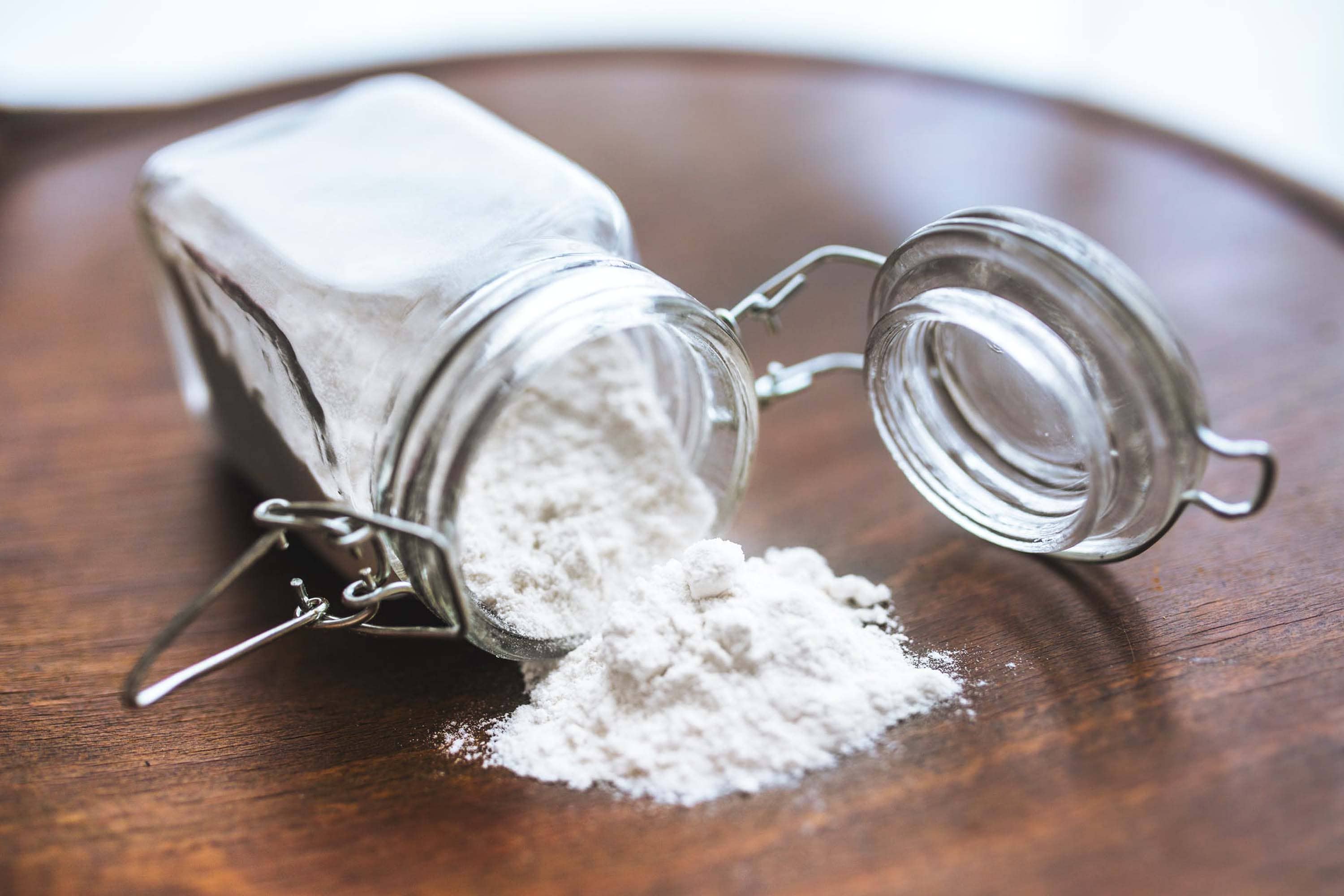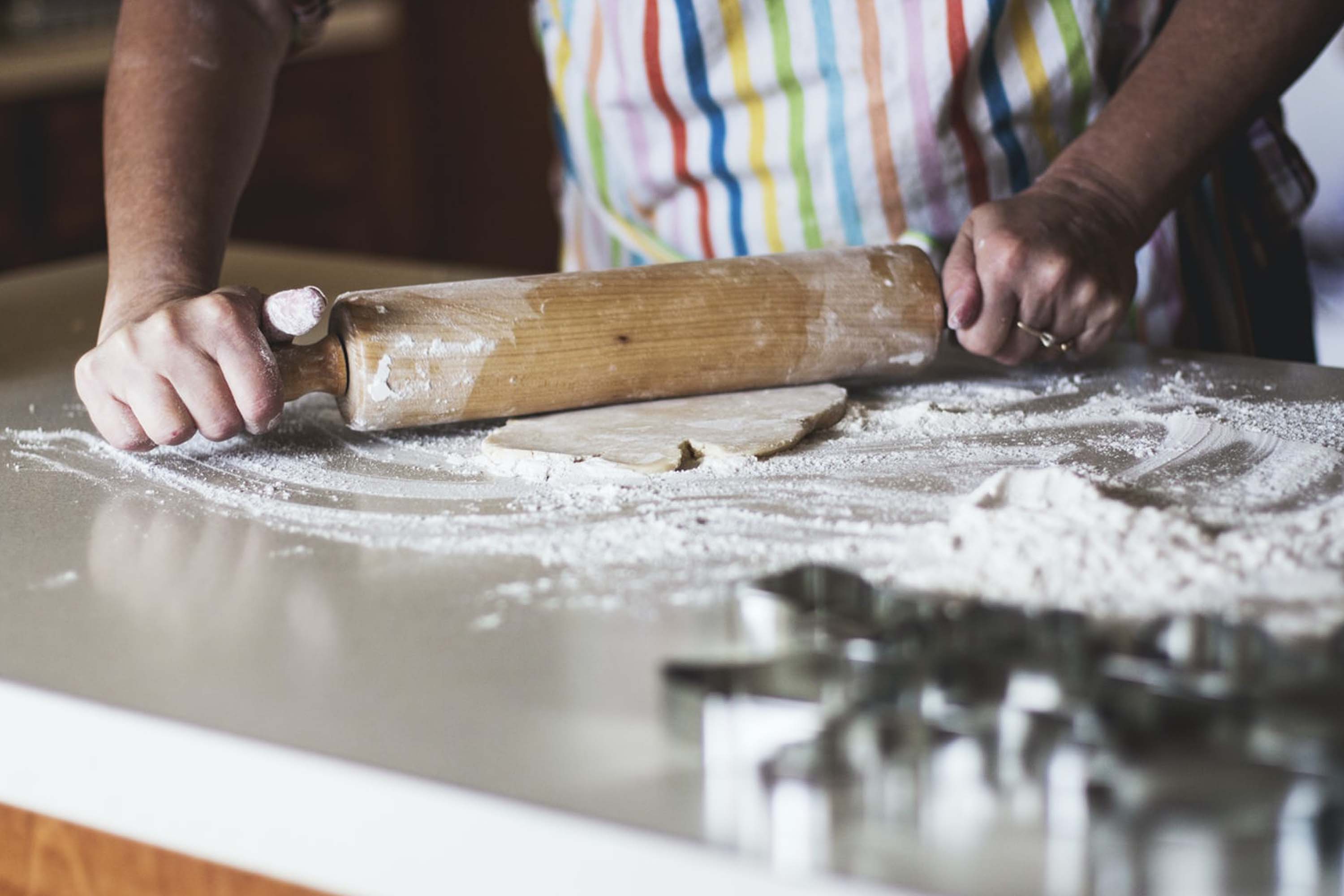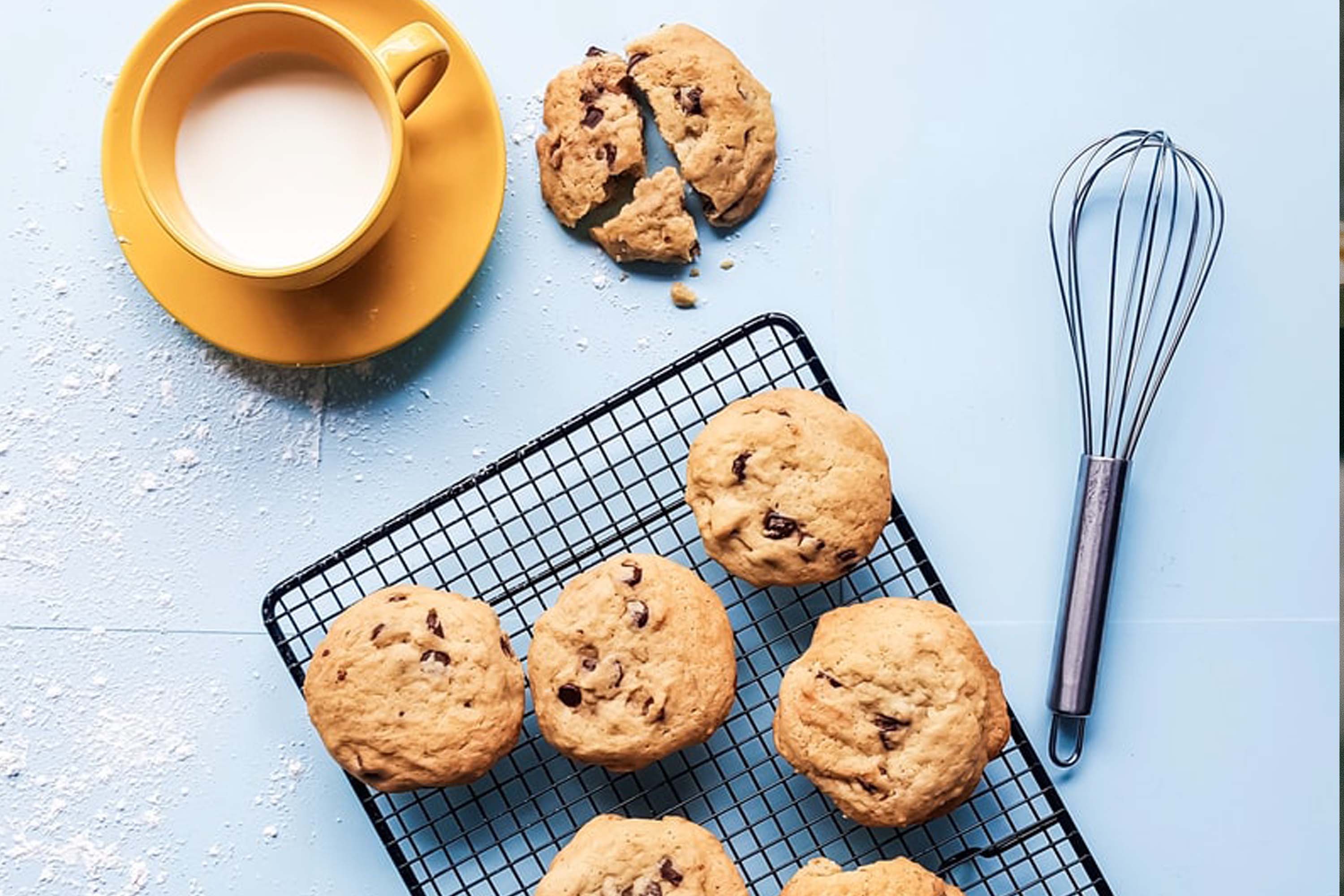Baking soda is truly universal stuff in any kitchen! This simple white fine powder can be used in tons of multiple ways (often far beyond cooking) that one can easily get astonished. And as long as we make use of it frequently enough, the issue of its spoilage does not bother us, let’s be honest.
But what if we go for it just now and then occasionally using a tiny pinch, and the rest of the time it stays in a box on a kitchen shelf? How long will it be able to last in such a case? Does baking soda go bad?
All these answers can be found below in our new and very informative article!
Does Baking Soda Go Bad?
Does baking soda expire? In a few words, yes, it does. This is the truth, and we can’t escape it, unfortunately. But don’t get upset too soon!
We suggest you dig deeper and make an attempt to figure out why this powder can degrade over time, how its lifespan can be extended (if it can be), and what simple rules to follow so that your humble kitchen helper will serve longer and perform its tasks the same efficiently as on the day of purchase.
It does not matter what foodstuff we are talking about, whether it is a bottle of cheap acetum or a packet of fine cocoa powder, whenever it comes to spoilage and term of use, this appears to be the greatest point of concern for any home chef!
Naturally, with baking soda, it is all the same. Perhaps, somewhere in a parallel world, this stuff can last forever without even the slightest quality change, but in this reality, it does go bad under certain conditions.
The most common reason why this handy almost all-purpose powder can start degrading is moisture.
See, when the product remains tightly sealed in a box, moisture can’t reach it no matter what. However, the second we open it, we open the way for moisture as well. And since most of us stock this leavening agent in the original package opened instead of removing it to another tightly sealed tank, we provoke the spoilage process this way.
Sodium bicarbonate is the kind of product that tends to absorb, and it absorbs moisture especially well.
So after the box is unsealed, the absorption process begins and keeps on gradually day by day. As a result, the leavening agent loses its potency and the power of the lifting reaction also goes down.

This is why people often can see that old sodium bicarbonate when being added to the dough, does not create the same raising effect as it used to do before, and the pastry or other baked goodies remain flat instead of lifting.
How to Define Expired Baking Soda?
If this product can become useless quite easily just because of being exposed to natural moisture in the air, is there a way to define the expired baking soda in time? In fact, yes, one efficient method does exist, and it will not require any special skills or tools.
Since sodium bicarbonate is a lifting agent, it responds to other ingredients or to the temperature, so all we need to do to check whether it is still working is to see how the powder will react to those conditions.
To perform such a “chemical test”, get all the stuff ready:
- Prepare half a mug of hot tap aqua
- Add a quarter of white acetum to it since sodium bicarbonate (unlike baking powder) needs an acidic environment to react properly
- Now simply take a quarter spoonful of soda powder, and drop it into hot water with acetum dissolved in it. If the product is still of proper quality, you will see bubbles and fizzing appearing.
If no such things show up, then your product is either spoiled or expired far beyond its expiry date. Better discard it and buy a new one since old baking soda will not be able to lift baked goods properly.
Except for that fizzy reaction, no other signs like a bad smell or improper appearance of the powder will show that something is wrong with it.
How Long Does Baking Soda Last?
Naturally, home chefs would like to know how much time they have until this useful leavening agent becomes completely useless. Well, yes, baking soda does not last eternally (alas), but it still has quite a long term of use. Nevertheless, we must not forget about its tendency to absorb moisture, so the better it is sealed the longer it will stay usable, that is the rule of thumb!
As for the lifespan duration, it strongly hangs upon how we stock the powder. When being kept in an unsealed box or packet we purchased it in, it can basically last indefinitely if we keep it under the correct conditions. Nevertheless, it is best to make use of it within two years since after that, the potency of the powder will start degrading rapidly.
However, after we open the box, the countdown begins and the term of this product’s use shortens to approximately six months. Again, if it will be stocked in a proper surrounding and under the correct conditions that we will talk about a bit later.
[table id=118 /]
Also, take into consideration that this powder absorbs not only moisture but also odors like a sponge, so we suggest everyone who uses it frequently pick up a hermetic moisture-proof and odors-proof tank that can be safely resealed in case of a need.
Place the tank in a cool and dry location, and like that, you will protect the product from an early “aging” better than when leaving it in a carton box.
What Is Baking Soda?
So what is that mysterious white stuff, in fact, has anyone ever wondered? We make use of it almost daily for various cooking needs, and some creative individuals even discovered that sodium bicarbonate is great stuff for cleaning tasks!

We will begin our story by revealing its true name which is sodium bicarbonate. Sounds impressive, eh? This stuff belongs to the group of elements that we call base. Remember those chemistry lessons at school when we had a task to mix this powdered substance with acetum to get a bubbling volcano? We are sure everyone does! So that was a traditional reaction that soda produces when getting in contact with acids.
And this is the exact reaction that takes place in all our pastries, cookies, cakes, and breads when we add this finely powdered stuff to the dough to lift it. What does baking soda do? See, this powder works as a raising agent when being blended with acid. This is why we must always add some acidic stuff like acetum, sugar, honey, cream of tartar, yogurt, or citrus juice to trigger that reaction to happen when we go for baking soda for baking.
However, we must always take into consideration that too much sodium bicarbonate is the same bad as not enough of it. If we put too little of it, the dough will not lift properly and the goodie will be flat and raw.
However, if we add too much of this stuff, it will add to the dish that specific metallic and soapy taste that can ruin even the tastiest cake. To escape that definitely unwanted scenario, stick to the simple measurement hint: per one cup of flour, add a quarter spoonful of baking soda.
Where does baking soda come from? Well, we will not tire you with a detailed description of the soda-making procedure. To be short, this handy stuff comes either from soda ash that is received through the Solvay process or it is produced from trona ore, a hard crystalline material.
The curious fact about the second way of production (yeah, that trona ore one) is that this crystalline stuff was formed millions of years ago! It originates from the area of the Wyoming river that once used to be covered with a huge lake. When that reservoir dried out because of evaporation, it left a 200-billion-ton deposit of purest trona. That is enough to meet the human needs of sodium bicarbonate for dozens of generations ahead! Perhaps, this is the explanation why this stuff is so cheap.
Is Baking Soda Bad For You?
With the development of all sorts of alternative treatment approaches and alternative medicine, it became popular to make use of sodium bicarbonate for internal use in its pure state instead of consuming it only as a part of baked foodstuff.
Of course, everyone began wondering how safe it is. Can you drink baking soda? Can you eat baking soda? Hold on, hold, on, let’s take one step at a time!
- As for drinking it, baking soda dissolved in water is indeed a good remedy for sudden acid reflux. The safe dosage for grown-ups is half a small spoonful dissolved in a four-ounce amount of aqua.
Sip it without hurrying to avoid any unpleasant or disturbing aftermath like gas or diarrhea, and repeat every two hours if needed. However, take into consideration that this stuff is not recommended for an extended treatment!
- As for eating baking soda, we would definitely not recommend you guys doing that. The explanation is obvious: this stuff is not edible. We can add it to our baked goodies but consider that we use a tiny bit of it. And even if the powder is used for medical purposes (like described above), it is consumed in safe amounts and for a short period of time to make no harm.
However, an extended consumption of it, the same as a single consumption of an excessive amount of the powder, can cause serious toxicity and problems with your stomach!
So if someone says we can safely consume soda in its pure state, better ask your doctor to skip any unwanted and dangerous effects such behavior can have on your well-being.
How to Store Baking Soda?
This powder seems to be so simple, however, the truth is that it is pretty tricky in terms of storage. We already figured out that baking soda acts like a sponge when it comes to other odors and moisture. It means that for keeping it properly, one needs to take several handy suggestions into consideration:

- Never store it in the carton box it was sold. Carton does not protect the content from external odors and moisture which means the product will degrade sooner.
- Instead, replace the powder into moisture and odors-proof resealable tank with a hermetic lid. Like that, your soda will last much longer.
- If the powder is sold in a plastic pouch, it is OK to leave it there since such a packet is better than a carton box anyway. It will be even better if you purchase the product in a plastic bucket.
- Do not keep this stuff close to any strong-smelling foods and spices.
- Ensure it is left in a location that is dry and cool (40-70 degrees).
With these simple hints, it will be possible to extend the lifespan of this stuff and make it last longer.
Are Baking Soda And Baking Powder The Same?
Since most of us prefer to make use of lifting agents for various cooking purposes, the question often arises of whether culinary soda and baking powder are the same things. We are sure everyone has seen them on the store shelves and wondered what the distinctions were, right? So we decided to make it clear and define the major differences between these two so seemingly similar products.
What is sodium bicarbonate?
This is a leavening agent that looks like white crystalline powder being naturally base or alkaline. It has no specific smell, and its taste is rather metallic if you taste a pinch.
This powder gets activated once it is mixed with acid and liquid, and this is the reason why we always use either acetum or other acidic ingredients when using baking soda.
What does baking soda do in cookies? Well, its major “responsibility” is to lift the dough and make baked goodies rise. If used in proper amounts, it will make the food fluffy and tender, but if we add too much of this lifting agent, the taste of the final foodstuff will most likely get that prominent metallic tone making it difficult to eat.
What is baking powder?
This is a completely lifting agent that has a powder-like texture and helps our baked goodies rise. What does that “completely” mean? It indicates that this stuff already contains both base and acid and needs no additional components for producing a leavening reaction. As a buffer, cornstarch is often added to baking powder to prevent the activation while keeping the powder.
What does baking powder do in cookies?
The major purpose of baking powder is basically the same as sodium bicarbonate meaning it lifts the dough.
In general, it becomes clear from the recipe which one to use, but if it doesn’t, then simply remember that sodium bicarbonate needs to be used if the recipe has any acidic ingredients (for instance, citrus juice, buttermilk, yogurt, etc). Conversely, baking powder fits better when the recipe features acidic components not.
Nevertheless, it is sometimes required to go for both. It happens when the recipe contains acidic components that must be offset by sodium bicarbonate, but it will be not enough to lift the dough so baking powder is also needed.
Does Baking Powder Expire?
Just like its powdered leavening “cousin”, baking powder does not live forever. And exactly like sodium bicarbonate, it is also very sensitive to moisture and humidity.
So if it is kept properly in a dry and cool area, its lifespan may be six to twelve months, but under the wrong conditions, be ready for this period to shorten.
To define the expired baking powder, simply learn how to test baking powder at home: put half a small spoonful in a bowl and pour 60 ml boiling aqua over it. If it starts bubbling up actively, then everything is fine. If it doesn’t, well, then it’s probably old and must be discarded.
How Long Does Baking Powder Last?
Normally, this leavening powder remains usable for half a year and up to twelve months if kept in a dry and cool area, tightly sealed, and away from any moisture and humidity sources.
Under the wrong conditions, baking powder will degrade faster, so if yours has been staying on a kitchen shelf for way too long, better give it a test to see whether it is still active or not.
This was a brief overview of the two most usable leavening agents. Now you are aware of how to keep them, how to tell if they are still usable or not, and also learned handy lifehacks regarding how to keep both active longer. So follow these recommendations, and may your bakery be tasty and light!\
[wp-faq-schema title=”Frequently Asked Questions”]

Does baking soda go bad if its taste is fishy? I’m having the box of it for quite a long time so maybe it’s just already bad?
If by saying fishy you mean the specific metallic taste, then it’s fine since it’s the normal taste of soda. I’d recommend you testing it. Simply add some vinegar and see if bubbles will appear. If they won’t, then your soda is dead.
Hi! Please help me to figure out how to keep baking soda! Does baking soda go bad if opened? I mean if I just leave it in a carton bow unsealed?
Hey! Yep, it will spoil (well, actually, not spoil but lose potency). Better transfer it into a hermetic tank that is odors and moisture-proof.
Does baking soda go bad sitting in the refrigerator? Has anyone ever tried to keep it like this?
Actually, soda can be placed in the fridge to absorb unwanted odors, but not for storage definitely! It will degrade since it’s too humid for it there.
I bought a box of baking soda more than 6 months ago, and it’s still not used completely. When does baking soda go bad? Does it make sense to keep it?
I’d say if it is still active, why not? Use it. Just check it for a proper reaction: take a spoon of soda and add some vinegar to it. Are there bubbles? Good, then it’s working! No bubbles? Well, buy a new one then.
I have recently found some bugs in my kitchen cabinet where I keep flour and grains, and baking soda as well. So I’m thinking of removing my baking soda to the fridge instead while I clean everything up in the cabinet. Does anyone know whether baking soda goes bad in the fridge?
Well, I only know that it can be kept refrigerated if you need to eliminate odors in the fridge. The same works for the freezer, by the way! As for the storage in particular…I guess you can keep it this way, only not too long since this powder tends to absorb odors very well. Will it go bad? If it absorbs too many odors, then it’ll lose its potency and, well, become useless, yes.
Does baking soda go bad for cleaning? I mean, if I’m using it for cleaning purposes mostly, does it matter whether the powder has expired or not? Thanks!
It doesn’t matter whether baking soda has expired or not if you use it for cleaning. That’s because it still has its abrasive properties that are needed for cleaning.
How to tell if baking soda is still good? Can I tell it by the smell or appearance of the powder somehow?
The only method that I know requires making a little experiment that is the following: you take a spoon of baking soda and add some vinegar to it. If the powder starts bubbling and hissing, then it’s still ok. But if you see no reaction, then your baking soda has lost its potency.
I have a can of baking soda that’s been kept on the kitchen shelf for quite a long time. I guess, around 20-30 days or so! Can I still use baking soda after 30 days? What do you think?
Well, technically, yes, you can still use it. Since it was kept outside the fridge, it hasn’t absorbed any odors I suppose. Which means that the powder is still possible to use as a leavening agent.
What do you do with old baking soda? I have half a package left that’s been stored for a couple of months, and it’s already very weak. So I’d not use it for baking or other stuff. But maybe I could make use of it somehow else?
Why, use it for cleaning! Baking soda is a great and delicate abrasive agent that’s very gentle on surfaces that are sensitive to scratches. And it doesn’t matter whether it’s still usable or not – its potency doesn’t affect its cleaning properties.
Can I use old baking soda to clean?
Yes, you can. In fact, this is what I do to old baking soda or baking powder if I buy too much and then don’t know where to use those leftovers.